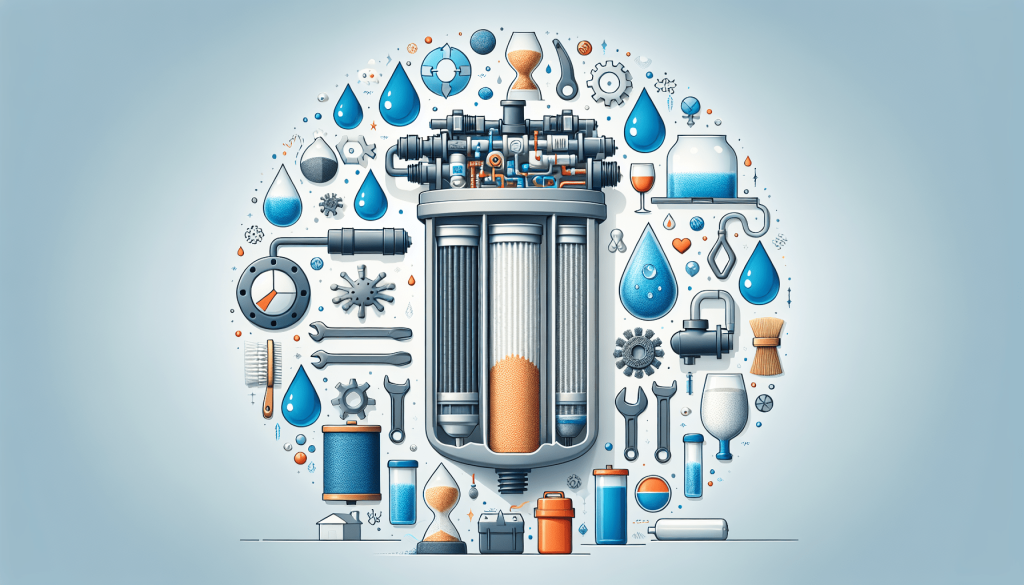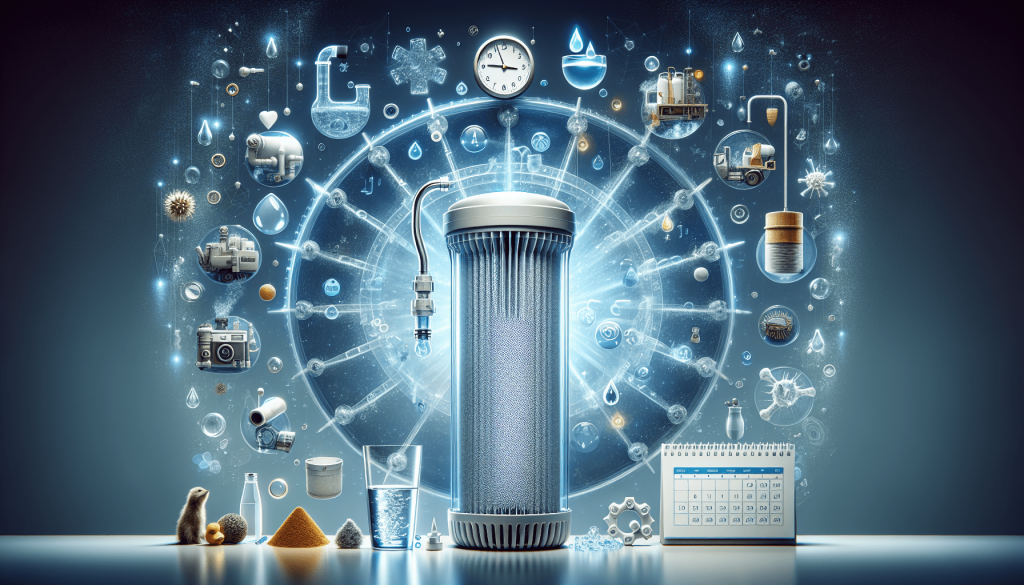Have you ever wondered how long your whole house water filter will last? We all know the importance of having clean and safe water for our homes, but the lifespan of these filters can be a mystery. In this article, we will explore the average lifespan of whole house water filters and provide some useful tips to help you extend their longevity. Say goodbye to guessing and hello to a clearer understanding of your water filtration system!
Types of Whole House Water Filters
When it comes to ensuring the quality of your household’s water supply, a whole house water filter is a wise investment. These filters are designed to remove contaminants from the water coming into your home, providing you with clean and safe water for drinking, cooking, bathing, and other daily activities. There are several types of whole house water filters available in the market, each with its own set of advantages and features. Let’s take a closer look at some of the most common types of whole house water filters.
Activated Carbon Filters
Activated carbon filters are one of the most popular choices when it comes to whole house water filtration, and for good reason. These filters work by adsorbing organic compounds, such as chlorine, pesticides, herbicides, and volatile organic compounds (VOCs), as the water passes through the activated carbon media. This process helps to improve the taste and odor of the water, making it more appealing for consumption. Activated carbon filters are also effective in removing certain heavy metals, such as lead and mercury.
Reverse Osmosis Filters
Another widely used type of whole house water filter is the reverse osmosis (RO) filter. These filters use a membrane to remove contaminants from the water through a process called osmosis. The membrane allows the passage of water molecules, while blocking the passage of larger particles and impurities. reverse osmosis filters are particularly effective in removing dissolved minerals, such as fluoride, arsenic, and calcium, as well as other contaminants, including bacteria, viruses, and heavy metals.
Ceramic Filters
Ceramic filters utilize a porous ceramic material to trap contaminants and impurities present in the water. These filters work by allowing the water to pass through the tiny pores of the ceramic material, effectively filtering out particles, sediments, bacteria, and other harmful substances. Ceramic filters are known for their durability and longevity, and they are capable of removing a wide range of contaminants from the water without the need for electricity or chemical additives.
UV Filters
UV filters employ ultraviolet light to disinfect the water and eliminate harmful microorganisms. These filters use UV lamps to emit ultraviolet rays that penetrate the cell walls of bacteria, viruses, and other pathogens, effectively destroying their ability to multiply and cause diseases. UV filters are highly effective in killing bacteria and viruses, making them an excellent option for households where microbial contamination is a concern. It’s worth noting that UV filters do not remove particulates or dissolved impurities; they solely focus on disinfection.
Factors Affecting the Lifespan
Now that we have a better understanding of the different types of whole house water filters, let’s delve into the various factors that can influence their lifespan. These factors play a crucial role in determining how long your water filter will last and when it’s time for a replacement. It’s important to keep these factors in mind to ensure that your filter continues to provide you with reliable and effective filtration.
Water Quality
The quality of the water being filtered is a significant factor that can impact the lifespan of your whole house water filter. If your water supply contains high levels of contaminants, such as heavy metals, sediment, or chemicals, your filter will need to work harder and may become clogged or exhausted more quickly. On the other hand, if your water is relatively clean, your filter may have a longer lifespan.
Water Usage
The amount of water being filtered on a daily basis also influences the lifespan of your whole house water filter. If you have a large household with high water consumption, your filter will be processing a larger volume of water, which can result in faster wear and tear. Conversely, if your household has lower water usage, your filter may last longer before needing replacement.
Filter Size
The size of your filter is another factor that can affect its lifespan. Larger filters typically have a higher filtration capacity and can handle larger volumes of water without becoming clogged or overwhelmed. Smaller filters, on the other hand, may require more frequent maintenance and replacement due to their limited capacity.
Maintenance
Proper maintenance is essential for maximizing the lifespan of your whole house water filter. Regular maintenance tasks, such as cleaning and replacing filter cartridges, can help prevent the buildup of contaminants and ensure optimal filtration performance. Neglecting to perform these maintenance tasks can lead to decreased filter lifespan and compromised water quality.

Activated Carbon Filters
Activated carbon filters are renowned for their effectiveness in removing contaminants and improving water taste and odor. To understand their lifespan and when to replace them, let’s explore how they work, their expected lifespan, and the signs that indicate it’s time for a replacement.
How They Work
Activated carbon filters work through a process called adsorption, where the carbon media attracts and retains impurities present in the water. When water passes through the filter, the activated carbon traps chlorine, volatile organic compounds (VOCs), pesticides, and other organic compounds, improving the aesthetic quality of the water.
Lifespan
The lifespan of activated carbon filters can vary depending on the quality of the water being treated and the filter’s capacity. On average, these filters may last anywhere from 6 to 12 months before needing replacement. However, it’s important to note that factors such as water quality and usage can influence the lifespan of the filter.
Signs of Replacement
Several signs indicate that your activated carbon filter is nearing the end of its lifespan and should be replaced. If you notice a decline in water quality, such as an unpleasant taste or odor returning, it’s a strong indication that the filter is no longer effective. Additionally, a decrease in water pressure or slower flow rate can suggest that the filter is clogged and needs replacement.
Reverse Osmosis Filters
Reverse osmosis filters are highly effective at removing dissolved impurities and providing clean, purified water. To understand their lifespan and when to consider replacement, let’s explore how they work, their typical lifespan, and the signs that may suggest it’s time for a new filter.
How They Work
Reverse osmosis filters use a semipermeable membrane to remove contaminants from water through the process of osmosis. Water is forced through the membrane, while larger particles and impurities are blocked, resulting in purified water on the other side. This filtration process helps to eliminate dissolved minerals, heavy metals, and other contaminants.
Lifespan
The lifespan of reverse osmosis filters typically ranges from 1 to 3 years, depending on the quality of the filter and the water being treated. Optimal performance can be maintained by regularly cleaning and maintaining the filter and ensuring that any pre-filters are replaced as needed.
Signs of Replacement
There are several signs that indicate it may be time to replace your reverse osmosis filter. If you notice a decline in water quality, such as an unpleasant taste, odor, or cloudiness, it may suggest that the filter is no longer effectively removing impurities. Additionally, if you experience a decrease in water pressure or a slower flow rate, it may be an indication that the filter is clogged and needs replacement.

Ceramic Filters
Ceramic filters are known for their durability and ability to remove a wide range of contaminants from water without the need for electricity or chemical additives. Let’s explore how ceramic filters work, their expected lifespan, and the signs that indicate it’s time for a replacement.
How They Work
Ceramic filters utilize a porous ceramic material to trap contaminants and impurities in the water. These filters consist of tiny pores that allow water to pass through while blocking larger particles and harmful substances. Ceramic filters are effective in removing sediments, bacteria, protozoa, and other harmful microorganisms.
Lifespan
Ceramic filters typically have a longer lifespan compared to other types of filters and can last anywhere from 6 months to 2 years, depending on the quality of the filter and water being treated. Regular cleaning and maintenance can help prolong the lifespan and maintain optimal filtration performance.
Signs of Replacement
If you notice a decline in water quality, such as the return of an unpleasant taste or odor, it may suggest that the ceramic filter is becoming less effective and needs replacement. Additionally, a decrease in water pressure or slower flow rate can indicate that the filter is clogged and requires a new ceramic element.
UV Filters
UV filters are an excellent choice for households concerned about microbial contamination. Let’s explore how UV filters work, their average lifespan, and the signs that may indicate it’s time to replace the UV lamp.
How They Work
UV filters utilize ultraviolet light to disinfect and eliminate harmful microorganisms present in the water. These filters use specially designed UV lamps that emit ultraviolet rays. When water passes through the filter and comes into contact with the UV light, the UV rays penetrate the cell walls of bacteria, viruses, and other pathogens, destroying their ability to multiply and cause diseases.
Lifespan
The lifespan of UV lamps used in UV filters typically ranges from 9 to 12 months. It’s important to follow the manufacturer’s guidelines and replace the UV lamp at regular intervals to ensure continued effectiveness in eliminating harmful microorganisms.
Signs of Replacement
A decrease in water quality, such as the presence of an unpleasant taste or odor, may indicate that the UV lamp is no longer functioning correctly and needs replacement. Additionally, if you notice a decline in water clarity or suspect microbial contamination, it’s advisable to replace the UV lamp to maintain optimal disinfection performance.

Factors to Consider When Choosing a Whole House Water Filter
Selecting the right whole house water filter for your household’s needs can seem overwhelming with various options available. To make an informed decision, consider the following factors:
Filter Lifespan
The lifespan of the filter is an important consideration. Evaluate how often the filter needs to be replaced and the associated costs. Longer-lasting filters may require less frequent replacement, saving you time and money in the long run.
Cost of Replacement Filters
Consider the cost of replacement filters for the whole house water filter system. Some filters may have a higher upfront cost but lower ongoing maintenance expenses, while others may be more affordable initially but require more frequent replacement, resulting in higher long-term costs.
Effectiveness in Removing Contaminants
Understand the specific contaminants that need to be addressed in your water supply and choose a filter capable of effectively removing those contaminants. Look for filters that are certified to meet industry standards for contaminant removal.
Ease of Maintenance
Consider the maintenance requirements of the filter system. Determine if regular cleaning and filter replacement can be easily carried out by homeowners or if professional assistance is needed. Opt for a system that aligns with your maintenance capabilities and preferences.
Installation Requirements
Finally, consider the installation requirements of the whole house water filter system. Some filters may require professional installation, while others can be easily installed by homeowners. Take into account the available space, plumbing configuration, and any specific installation considerations when choosing a filter.
Maintaining a Whole House Water Filter
Proper maintenance is crucial to ensure that your whole house water filter continues to provide clean and safe water for your household. By following a regular maintenance routine, you can prolong the lifespan of the filter and maximize its effectiveness. Here are some essential maintenance tasks to consider:
Cleaning Schedule
Regularly clean the filter housing and any removable components as recommended by the manufacturer. This helps prevent the buildup of sediment and contaminants, ensuring optimal filtration performance. Follow the provided instructions to avoid damaging the filter during the cleaning process.
Replacement Schedule
Replace filter cartridges, membranes, or media at the recommended intervals or as specified by the manufacturer. Regularly inspect the condition of the filter components to determine if replacement is necessary. Not replacing filters on time can result in reduced filtration efficiency and compromised water quality.
Regular Inspections
Perform regular inspections of the filter system to check for any signs of damage or wear. Look for leaks, cracks, or other defects that may affect the performance of the filter. Address any issues promptly to prevent further damage and ensure uninterrupted filtration.

Signs That Your Whole House Water Filter Needs Replacement
While regular maintenance can help prolong the lifespan of your whole house water filter, there will come a time when it needs to be replaced. Here are some common signs that indicate your water filter may need replacement:
Decreased Water Pressure
If you notice a significant decrease in water pressure throughout your home, it may suggest that your water filter is becoming clogged with sediment, contaminants, or other impurities. A decrease in water pressure can affect the flow rate and indicate that it’s time to replace the filter.
Unpleasant Taste or Odor
If you start to notice an unpleasant taste or odor in your tap water, it could be an indication that your whole house water filter is no longer effectively removing the contaminants responsible for these issues. Replacing the filter can help restore the taste and odor of your water.
Cloudy or Discolored Water
Cloudy or discolored water is often a sign that your water filter is no longer effectively removing sediment and other particles from the water. It may suggest that the filter is clogged or exhausted and needs to be replaced to restore water clarity.
Increased Frequency of Plumbing Issues
If you experience a sudden increase in plumbing issues, such as clogged pipes, faucets, or showerheads, it may be attributed to an ineffective water filter. Over time, sediment and contaminants can accumulate in the plumbing system, leading to plumbing issues. Replacing the filter can help prevent further problems and maintain the health of your plumbing system.
Exceeding the Manufacturer’s Recommended Lifespan
Each whole house water filter has a manufacturer’s recommended lifespan. If you have been using the filter beyond this lifespan, it’s crucial to replace it to ensure optimal filtration performance. Using an expired filter can compromise water quality and put your health at risk.
Conclusion
In conclusion, investing in a whole house water filter is a proactive step towards ensuring the quality and safety of your household’s water supply. With various types of whole house water filters available, including activated carbon filters, reverse osmosis filters, ceramic filters, and UV filters, you can choose the one that best suits your specific needs.
Factors such as water quality, water usage, filter size, and maintenance can significantly influence the lifespan of your water filter. Regular maintenance, including cleaning, replacement schedules, and inspections, is essential for maintaining optimal filtration performance and maximizing the lifespan of your filter.
Signs such as decreased water pressure, unpleasant taste or odor, cloudy or discolored water, increased plumbing issues, or exceeding the manufacturer’s recommended lifespan indicate that it may be time to replace your whole house water filter.
By considering factors such as filter lifespan, cost of replacement filters, effectiveness in removing contaminants, ease of maintenance, and installation requirements, you can choose the right whole house water filter for your household’s needs.
Remember, regular maintenance and timely replacement are key to ensuring that your whole house water filter continues to provide you and your family with clean, safe, and refreshing water.



